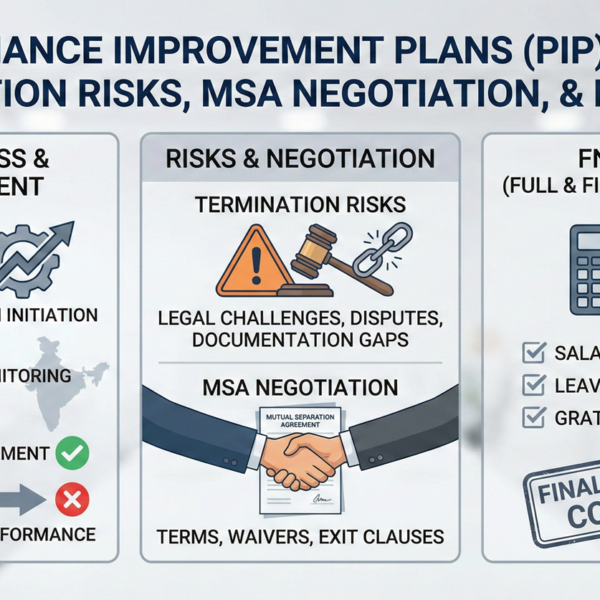If you’re a new employee in India, you’ve likely faced an “employment bond” or “service agreement.” But is it legally enforceable? This guide reveals the critical difference between a bond being legal to sign and enforceable in court. We dive deep into the Indian Contract Act, explaining how Section 74 (Actual Loss) almost always overrides the massive penalty amount. Learn your rights, what to do if an employer illegally withholds your salary or documents, and how to navigate this complex issue with confidence.
Employment Bonds in India for New Employees: Navigating Legality, Enforceability, and Employee Rights and Template Formats
If you're a new employee in India, you've probably heard of or even been asked to sign an "employment bond" or "service agreement." This article breaks down what you need to know.
Here's the simple truth: Signing an employment bond in India is legal. But, getting a court to enforce it (make you pay) is extremely difficult for the employer.
Employers rely on new employees not knowing this difference. They use the signed paper to scare you into staying. This guide will show you how the law actually works, what to do if your employer plays dirty, and how to protect your rights.
The Central Misconception
The Two Laws You Must Know: Section 27 vs. Section 74
The whole issue of employment bonds boils down to a conflict between two parts of the Indian Contract Act, 1872.
- Section 27 (Restraint of Trade): This law says any agreement that stops you from practicing your profession is void. This is your right to work.
- Section 74 (Reasonable Compensation): This law deals with penalties in contracts. It says if you break a contract, you only have to pay "reasonable compensation" for the actual, provable loss you caused—not the giant, scary penalty amount written in the bond.
For decades, courts have had to balance these two. Here is what they have decided:
How Courts View Your Employment Timeline
The 2025 Vijaya Bank Case: A Game Changer?
You may hear employers mention the 2025 Supreme Court case *Vijaya Bank v. Prashant B. Narnaware*. In this case, the court upheld a 3-year, ₹2 lakh bond for a Senior Manager.
Does this mean all bonds are now enforceable? No. In fact, this case actually *helps* employees. The court upheld the bond *because* the bank (a PSU) could prove that replacing a high-level manager was a long, expensive, and difficult process. Their ₹2 lakh claim was seen as a "genuine pre-estimate of damages," not a random penalty.
This case solidifies the most important rule: the focus is now 100% on Section 74. The employer *must* prove their loss.
Will a Court Make You Pay? The "Actual Loss" Test
This is the most important question. Just because a bond is "legal" doesn't mean a court will make you pay the full ₹2 lakh, ₹3 lakh, or ₹5 lakh.
How Courts View Bond Penalties
Courts will almost never award the full penalty amount. They only award reasonable compensation for actual, documented losses (like specific training costs), which is usually a small fraction of the penalty.
The Burden of Proof is on the EMPLOYER
If you leave early, your employer cannot just deduct the bond amount from your salary. Their only legal option is to file a civil lawsuit against you.
In that lawsuit, the responsibility is 100% on them. They must show receipts. They need to prove to a judge that they lost *actual money* because you left.
The Scales of Justice
The employer carries the entire weight of proving their case in court.
What Counts as "Actual Loss"?
What can an employer *actually* claim?
- YES (Provable Loss): Invoices for a specific, external training course or certification you were sent for. Documented costs for a high-level recruitment agency to find your replacement.
- NO (Not a Loss): Standard one-week company induction. "Time spent by manager" on training you. Vague claims of "lost business" or "project delays." General on-the-job supervision.
If your company spent ₹50,000 on a certification for you, but the bond is for ₹3 lakhs, a court will *not* award ₹3 lakhs. It will award "reasonable compensation," which would likely be ₹50,000 (and maybe even less if you already served part of the bond period).
A Practical Guide: What to Do If Your Employer Plays Dirty
Since going to court is expensive and difficult, most employers try to scare you. They use illegal, coercive tactics to force you to pay the bond amount.
Do not panic. You have rights.
What's Happening to You? Click to See Your Rights.
Employer Actions vs. Your Rights: A Summary
Here is a quick reference table for common employer threats and your legal standing.
| Employer's Action / Threat | Legal Status | Your Best Recourse |
|---|---|---|
| "You must pay the full ₹5 Lakh penalty." | Unenforceable (as a penalty) | State that liability is limited to "reasonable compensation" for actual, proven losses (Section 74). Demand an itemized invoice of their loss. |
| "You cannot join a competitor for 2 years." | Void & Unenforceable | This is a "restraint of trade" (Section 27). This clause is worthless and can be ignored. |
| "We are suing you for the bond amount." | Legal (as a civil suit) | This is their only legal option. Don't be intimidated. Respond to the notice and demand they prove their *actual loss* in court. |
| "We are keeping your original certificates." | ILLEGAL (Forced Labour) | Send a Legal Notice. If they refuse, file a Police Complaint and contact the Labour Commissioner. |
| "We are withholding your final salary." | ILLEGAL (Illegal Wage Deduction) | File a complaint with the Labour Commissioner. This is their job, and it's a very effective and low-cost solution for you. |
| "We will not issue your experience letter." | Unfair Labour Practice | Send a Legal Notice and file a complaint with the Labour Commissioner. These are two separate issues. |
What Can You Do *Before* Signing? (A Guide to Negotiation)
Your power is highest *before* you have accepted the job. While many companies (especially large-scale recruiters) present bonds as "non-negotiable," you can still try to protect yourself.
- Ask for Justification: Politely ask, "Could you provide a breakdown of the ₹3 lakh figure? I'd like to understand what specific training costs it covers." This shows you are diligent and forces them to justify the amount.
- Negotiate the Amount: If they say the bond covers a specific ₹70,000 certification, respond with, "That makes sense. Would it be possible to amend the bond to state the liability is ₹70,000, to reflect the cost of the training?"
- Negotiate the Duration: A 3-year bond is excessive. A 1-year bond is more reasonable. You can say, "I am fully committed to growing with the company, but a 3-year period is a significant commitment. Would it be possible to reduce the service period to 18 months?"
- Ask for a "Pro-Rata" Clause: This is a very reasonable request. Ask them to add a sentence: "The liability under this bond shall be reduced on a pro-rata basis for each completed quarter of service." This means if you leave a 2-year bond after 1 year, you'd only be liable for half the (provable) cost.
- The "Magic Clause": If you can get them to add this one sentence, you are 100% protected: "Notwithstanding any other clause, the employee's liability shall be limited to the actual, documented, and pro-rated cost of specialized, non-routine training provided by the company."
Even if they say "no" to all of these, your polite, professional emails create a paper trail showing you were concerned about the "penalty" nature of the bond from day one, which can be useful later.
Anatomy of a Bond: Deconstructing the Template
Employers won't give you a template, but the agreement will look something like this. Here’s how to read between the lines.
Clause 1: The "Consideration"
"In consideration of the company providing specialized training, imparting trade secrets, and investing significant resources in the employee's development..."
What it really means: This is the company's attempt to establish their "actual loss" *before* it happens. This is the legal basis for their claim. The vaguer it is ("imparting trade secrets"), the weaker their claim. The more specific it is ("...a certification course in X"), the stronger their claim for that *specific amount*.
Clause 2: The "Service Period"
"The employee hereby agrees to serve the company for a minimum unbroken period of 36 (thirty-six) months from the date of joining..."
What it really means: This part is generally held to be legal by courts. It is not considered a "restraint of trade" *during* the employment. This is the core of the agreement.
Clause 3: The "Penalty / Liquidated Damages"
"In the event of a breach of Clause 2, the employee agrees to pay the company a sum of ₹5,00,000/- (Rupees Five Lakhs only) as 'liquidated damages' and not as a penalty..."
What it really means: This is the scariest and least enforceable part. Calling it "liquidated damages" is a legal trick to avoid the word "penalty." Courts ignore this label. They will *not* just grant ₹5,00,000. They will ask the company, "Show us the ₹5,00,000 in receipts." This clause is subject to Section 74, meaning it's reduced to "reasonable, actual loss."
Clause 4: The "Non-Compete" (Restraint of Trade)
"Furthermore, for a period of 2 years *after* leaving, the employee shall not join any competitor listed in Annexure A..."
What it really means: This clause is 100% VOID and worthless in India. It is a direct violation of Section 27 (Restraint of Trade). You can completely ignore it. The *only* exception is for protecting trade secrets, but they would have to prove you are actively using their stolen secrets, not just that you joined a competitor.
Frequently Asked Questions (FAQs)
Template Service Bond (For Educational Purposes)
This is a simplified example of what a service bond might look like. The annotations in yellow explain what each part really means.
SERVICE AGREEMENT CUM INDEMNITY BOND
This Agreement is made on this [Date] day of [Month], [Year]
BETWEEN:
[Company Name], a company incorporated under the Companies Act, 1956, having its registered office at [Company Address] (hereinafter referred to as "the Company").
AND:
[Employee Name], son/daughter of [Parent's Name], residing at [Employee Address] (hereinafter referred to as "the Employee").
WHEREAS:
A. The Company has offered the Employee the position of [Job Title] vide offer letter dated [Offer Date].
B. The Company will provide the Employee with specialized training, access to confidential information, and investment in professional development (hereinafter "Training").
NOW, THIS AGREEMENT WITNESSETH AS FOLLOWS:
1. Service Period:
The Employee agrees to serve the Company for a minimum, continuous, and unbroken period of [Number] (e.g., 24) months from the date of joining, [Date of Joining] (hereinafter "the Service Period").
2. Indemnity and Compensation:
In consideration of the Training and resources invested by the Company, the Employee agrees that if they leave, resign, abandon, or are terminated for cause before the completion of the Service Period, the Employee shall pay to the Company the sum of [Amount] (e.g., ₹3,00,000/-) as liquidated damages, not as a penalty, towards the costs incurred by the Company.
3. Termination by Company:
If the Company terminates the Employee's service for reasons other than misconduct or cause (e.g., layoff, redundancy), this Service Agreement shall become null and void, and the Employee shall not be liable to pay the amount mentioned in Clause 2.
4. Restraint of Trade:
The Employee agrees not to join any direct competitor of the Company for a period of [Number] (e.g., 12) months after the cessation of employment.
5. Governing Law:
This agreement shall be governed by the laws of India, and the courts of [City, e.g., Mumbai] shall have exclusive jurisdiction.
Conclusion: Your Key Takeaways
Navigating an employment bond can feel intimidating, but the law provides you with significant protections. Remember these three key points:
- Legal vs. Enforceable: It is legal for a company to ask you to sign a bond. It is not automatically enforceable. The huge penalty amount (e.g., ₹5 Lakhs) is a scare tactic.
- The "Actual Loss" Rule is Everything: The employer's *only* legal path is to sue you. In court, they throw out the penalty number. The entire burden of proof is on the employer to show receipts for "actual, reasonable, and provable" losses (Section 74). This is usually just the specific cost of external training, not a manager's time or "lost business."
- Your Rights are Protected: Any attempt to hold your original documents, withhold your earned salary, or refuse your experience letter is an illegal, coercive tactic. These actions are separate from the bond dispute, and you can (and should) take immediate action by contacting a lawyer or the Labour Commissioner.
Ultimately, knowledge is your best defense. Understand the terms, know your rights, and if you find yourself in a dispute, stay calm, communicate professionally, and seek qualified legal advice.
Disclaimer: The information provided in this article is for informational purposes only and does not constitute legal advice. The legal landscape is subject to change. For advice specific to your situation, please consult with a qualified legal professional.









